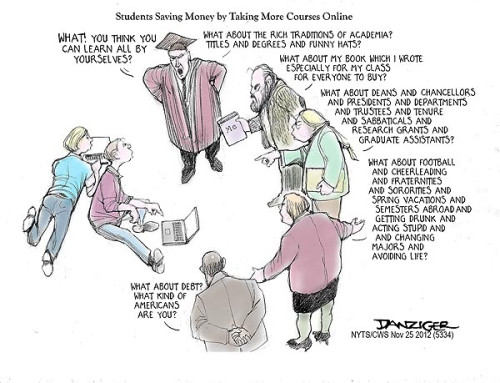Looking through the development in web-based online courses over the years, Tony bates, Contact North Research Associate and online learning specialist, believes 2013 is the year online learning comes of age.
In his recently released fourth annual predictions on how online learning will change in 2013, the online learning specialist predicts that web-base online education will experience a major shift into mainstream programs as the growth of hybrid learning – the re-design of courses to integrate the best of online and campus-based teaching – gain ground in the education industry. His predictions focus mainly in the US and Canada with a general outlook on the international community.
As a result, he predicts that academic institutions will consider distance-based online learning methods more of a priority within their long-term strategies.
Over all, the researcher believes that 2013 will prove to be a transformative year for online learning worldwide. Here is a summary of his predictions.
1. From the periphery to the centre:
More importantly, the researcher sees 2013 as a terrific year for online learning, where it moves from being an interesting sidebar, to becoming central to an institution’s operation. In particular, online learning will not continue to be supported or housed mainly in Continuing Education or Faculty of Extension, but will start to become integrated within the core activities of faculties and academic departments. If this is so, he said, then another set of sub-forecasts fall from this.
2. Hybrid learning:
According to the researcher, what’s primarily going to drive this move to the centre is not MOOCs but hybrid learning, involving the re-design of courses to integrate the best of online and campus-based teaching. This is being driven by dissatisfaction with very large lecture classes in first and second year university courses, the need for increased productivity/better learning in times of economic austerity, and faculty’s increasing familiarity with online learning in supporting regular lecture-based classroom teaching.
3. A strategic institutional approach to online and flexible learning
According to the report, the researcher expects to see online learning increasingly appearing as strategic initiatives within institutional plans (where institutions actually have concrete plans, which is still a surprisingly small proportion). A good example of such a strategic approach is the University of Western Sydney, which has developed a detailed strategy for hybrid learning which includes the issuing of iPads to all first year students. Developing institutional strategies for online learning will become increasingly necessary.
4. Outsourcing:
The researcher foresees that some institutions will outsource all or a significant part of their online learning activities to external organizations. In order of probability, he lists the services most likely to be outsourced as follows:
- 24×7 technical support
- learning management systems
- marketing of online courses
- online student administration:
- registration, assignment submission, assessment
- learner support/tutoring
- course design
- all online activities as a separate unit, with fees/royalties paid to the institution
5. The evolution of MOOCs: the trough of disillusionment?
The research predicts that as many new MOOCs now in development begin to roll out, activity in MOOCs will ramp up in 2013. That towards the end of the year, MOOCs will start entering the trough of disillusionment, although he doubt if they will hit bottom until 2014, when evaluation reports start to roll in, and the universities participating decide whether the business model works for them. He however thinks there is enough momentum though to carry them through 2013.
MOOCs, he said, will provide an accessible, low-cost source of up-dating for professionals, although there will still be increased demand for qualifications from lifelong learners through credit programming.
6. Open text books:
The online learning specialist predicts that open text books will become more popular in 2013. He draws his assumption from the initiative of an open text book scheme by the provincial government of British Columbia in 2012.
In essence, it is asking BC institutions to come forward with proposals for developing open text books for large enrollment courses, such as Psychology 100. The program is modelled on a similar program from the state of California. The idea is that the text once developed will be available for free for all students taking Psychology 100 across the province.
If two of the leading research universities, such as UBC and the University of Victoria or Simon Fraser University, were to get together, they could ensure that the text book would cover at least 50% of the students enrolled in that level of course in the province, and would put enormous pressure on the other universities to follow suit. Thus this has the potential for scaling up dramatically.
7. The year of the tablet?
Logically, tablet use should grow in 2013, he says. It’s the obvious way to store and access textbooks, they provide any time anywhere access to learning, they are more portable and cheaper than laptops, and they could provide extraordinary interactivity with learning materials. He further states that, there are too many uncertainties to be confident about tablets taking off this year in post-secondary education, although he believe their time will come.
8. Flexible course design (FCD)
The online learning specialist sees FCD as being somewhere in between the full, ADDIE-type instructional design model, and the complete lack of pedagogy in video lecture-based online and hybrid learning. According to him, it will be developed in response toVUCA: volatile, uncertain, complex and ambiguous environments, which is a pretty good description of online learning these days.
9. International
Due to the new President promising a national online virtual university and his promise to open up Mexico’s telecommunication industry to more competition, the researcher believes that the cost of internet access will decline rapidly from its very high current level, thereby opening up a huge market for online learning in Mexico.
Asia already has massive numbers of online learners, particularly in South Korea, Malaysia and China. India now has the Aakash 2 tablet, and a strategy for online science teaching through the Indian Institues of Technology, and is likely to expand its online teaching rapidly.
However, the government of India is putting in place a national high speed network connecting the major universities and colleges. India also has a thriving e-learning service and course design industry, mainly focused to date on international and business services but which will be able to ramp up online learning in India very quickly as Internet access improves.
10. Expect the unexpected:
The researcher reassures that as far as online learning is concerned, the only thing you can really be certain of is the uncertainty.










